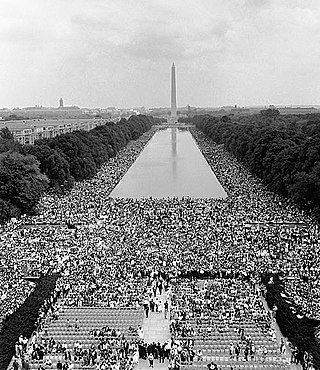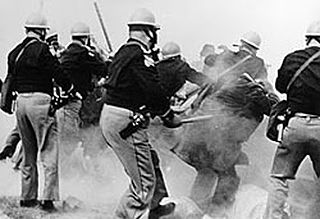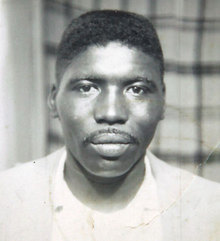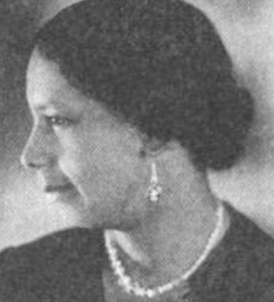Related Research Articles

The civil rights movement was a social movement and campaign from 1954 to 1968 in the United States to abolish legalized racial segregation, discrimination, and disenfranchisement in the country. The movement had its origins in the Reconstruction era during the late 19th century and had its modern roots in the 1940s. After years of direct actions and grassroots protests, the movement made its largest legislative gains in the 1960s. The social movement's major nonviolent resistance and civil disobedience campaigns eventually secured new protections in federal law for the civil rights of all Americans. The social movement's span of time is called the civil rights era.

Medgar Wiley Evers was an American civil rights activist and soldier who was the NAACP's first field secretary in Mississippi. Evers, a United States Army veteran who served in World War II, was engaged in efforts to overturn racial segregation at the University of Mississippi, end the segregation of public facilities, and expand opportunities for African Americans, including the enforcement of voting rights when he was assassinated by Byron De La Beckwith.

The Student Nonviolent Coordinating Committee was the principal channel of student commitment in the United States to the civil rights movement during the 1960s. Emerging in 1960 from the student-led sit-ins at segregated lunch counters in Greensboro, North Carolina, and Nashville, Tennessee, the Committee sought to coordinate and assist direct-action challenges to the civic segregation and political exclusion of African Americans. From 1962, with the support of the Voter Education Project, SNCC committed to the registration and mobilization of black voters in the Deep South. Affiliates such as the Mississippi Freedom Democratic Party and the Lowndes County Freedom Organization in Alabama also worked to increase the pressure on federal and state government to enforce constitutional protections.

The March on Washington for Jobs and Freedom, also known as simply the March on Washington or the Great March on Washington, was held in Washington, D.C., on August 28, 1963. The purpose of the march was to advocate for the civil and economic rights of African Americans. At the march, final speaker Dr. Martin Luther King Jr., standing in front of the Lincoln Memorial, delivered his historic "I Have a Dream" speech in which he called for an end to racism and racial segregation.

The Southern Christian Leadership Conference (SCLC) is an African-American civil rights organization based in Atlanta, Georgia. SCLC is closely associated with its first president, Martin Luther King Jr., who had a large role in the American civil rights movement.

The Selma to Montgomery marches were three protest marches, held in 1965, along the 54-mile (87 km) highway from Selma, Alabama, to the state capital of Montgomery. The marches were organized by nonviolent activists to demonstrate the desire of African-American citizens to exercise their constitutional right to vote, in defiance of segregationist repression; they were part of a broader voting rights movement underway in Selma and throughout the American South. By highlighting racial injustice, they contributed to passage that year of the Voting Rights Act, a landmark federal achievement of the civil rights movement.

James Earl Chaney was an American civil rights activist. He was one of three Congress of Racial Equality (CORE) civil rights workers killed in Philadelphia, Mississippi, by members of the Ku Klux Klan on June 21, 1964. The others were Andrew Goodman and Michael Schwerner from New York City.

Edgar Ray Killen was an American Ku Klux Klan organizer who planned and directed the murders of James Chaney, Andrew Goodman, and Michael Schwerner, three civil rights activists participating in the Freedom Summer of 1964. He was found guilty in state court of three counts of manslaughter on June 21, 2005, the forty-first anniversary of the crime, and sentenced to 60 years in prison. He appealed the verdict, but the sentence was upheld on April 12, 2007, by the Supreme Court of Mississippi. He died in prison on January 11, 2018, at age 92.
This is a timeline of African-American history, the part of history that deals with African Americans.

Jimmie Lee Jackson was an African American civil rights activist in Marion, Alabama, and a deacon in the Baptist church. On February 18, 1965, while unarmed and participating in a peaceful voting rights march in his city, he was beaten by troopers and fatally shot by an Alabama state trooper. Jackson died eight days later in the hospital.

Vernon Ferdinand Dahmer Sr. was an American civil rights movement leader and president of the Forrest County chapter of the NAACP in Hattiesburg, Mississippi. He was murdered by the White Knights of the Ku Klux Klan for his work on recruiting Black Americans to vote.
The United Klans of America Inc. (UKA), based in Alabama, is a Ku Klux Klan organization active in the United States. Led by Robert Shelton, the UKA peaked in membership in the late 1960s and 1970s, and it was the most violent Klan organization of its time. Its headquarters was the Anglo-Saxon Club outside Tuscaloosa, Alabama.

Lillie May Carroll Jackson, pioneer civil rights activist, organizer of the Baltimore branch of the NAACP. Invariably known as "Dr. Lillie", "Ma Jackson", and the "mother of the civil rights movement", Lillie May Carroll Jackson pioneered the tactic of non-violent resistance to racial segregation used by Martin Luther King Jr. and others during the early civil rights movement.

The St. Augustine movement was a part of the wider Civil Rights Movement, taking place in St. Augustine, Florida from 1963 to 1964. It was a major event in the city's long history and had a role in the passage of the Civil Rights Act of 1964.

The Green Memorial A.M.E. Zion Church is a historic church at 46 Sheridan Street in Portland, Maine, United States. A 2+1⁄2-story structure of textured concrete block masonry, it was built in 1914 to house the congregation founded in 1891. It is named after founder Moses Samuel Green, in his day the city's wealthiest African American. In the middle part of the 20th century, his church was the focal point of the Portland's African-American community, who hosted social events there and organized within the building for civil rights advancements both in Maine and across the US.
The Alabama Christian Movement for Human Rights (ACMHR) was an American civil rights organization in Birmingham, Alabama, which coordinated boycotts and sponsored federal lawsuits aimed at dismantling segregation in Birmingham and Alabama during the civil rights movement. Fred Shuttlesworth, pastor of Bethel Baptist Church, served as president of the group from its founding in 1956 until 1969. The ACMHR's crowning moment came during the pivotal Birmingham campaign which it coordinated along with the Southern Christian Leadership Conference during the spring of 1963.
This is a timeline of the civil rights movement in the United States, a nonviolent mid-20th century freedom movement to gain legal equality and the enforcement of constitutional rights for people of color. The goals of the movement included securing equal protection under the law, ending legally institutionalized racial discrimination, and gaining equal access to public facilities, education reform, fair housing, and the ability to vote.
Wharlest Jackson was an American civil rights activist who was murdered by a car bomb, with evidence of involvement by a white supremacy organization; it has been an unsolved murder since the 1960s. Jackson served as treasurer of the Natchez, Mississippi branch of the NAACP until his assassination by a car bomb, which was placed on the frame of his truck under the driver-side seat. The bomb exploded at approximate 8 p.m. on February 27, 1967. The explosion occurred when he switched on his turn signal on his way home. The explosion caused serious damage to Wharlest's lower torso and he died at the scene. The scene of his death was six blocks away from the site where he was employed, at Armstrong Rubber and Tire Company.
Ralph Edwin King Jr., better known as Ed King, is a United Methodist minister, civil rights activist, and retired educator. He was a key figure in historic civil rights events taking place in Mississippi, including the Jackson Woolworth’s sit-in of 1963 and the Freedom Summer project in 1964. Rev. King held the position of chaplain and dean of students, 1963–1967, at Tougaloo College in Jackson, Mississippi. At this critical juncture of the civil rights movement, historian John Dittmer described King as “the most visible white activist in the Mississippi movement.”
References
- 1 2 3 4 5 6 Thompson, Bennie. "Honoring Pratt Memorial United Methodist Church". Library of Congress. Retrieved 7 September 2015.[ permanent dead link ]
- 1 2 3 4 Mills, Kay (August 2007). This Little Light of Mine: The Life of Fannie Lou Hamer . The University of Press of Kentucky. p. 352. ISBN 978-0-8131-9182-9 . Retrieved 7 September 2015.
reverend allen johnson.
- ↑ O'Brien, M. J. (March 1, 2013). We Shall Not Be Moved: The Jackson Woolworth's Sit-In and the Movement It Inspired. Univ. Press of Mississippi. p. 118. ISBN 9781617037436 . Retrieved 7 September 2015.
- 1 2 3 "Program from the SCLC's Tenth Annual Convention". The King Center. Archived from the original on 26 September 2015. Retrieved 7 September 2015.
- 1 2 3 Branch, Taylor (2006). At Canaan's Edge: America in the King Years, 1965-68 . Simon & Schuster. ISBN 978-0-684-85712-1 . Retrieved 7 September 2015.
reverend allen johnson.
- ↑ Hebrews 13:2
- 1 2 3 4 Smith, Abbe; Freedman, Monroe. How Can You Represent Those People. palgrave.
- ↑ Dittmer, John (1994). Local People: The Struggle for Civil Rights in Mississippi . University of Illinois Press. ISBN 978-0-252-02102-2.
- ↑ Johnston, Araminta (17 December 2010). And One Was a Priest: The Life and Times of Duncan M. Gray Jr. University of Press of Mississippi. ISBN 9781604738292 . Retrieved 7 September 2015.
- ↑ Garrow, David. "Many Birminghams: Taking Segregationists Seriously". Southern Changes. Archived from the original on 1 February 2016. Retrieved 7 September 2015.
- ↑ Sweet, Grace (2013). Church Street: The Sugar Hill of Jackson, Mississippi. The History Press. ISBN 9781626191112 . Retrieved 7 September 2015.
- 1 2 3 4 5 Draper, Alan (1994). Conflict of Interests: Organized Labor and the Civil Rights Movement in the South, 1954 - 1968. Cornell University. ISBN 0875463169 . Retrieved 8 September 2015.
- 1 2 Bolton, Charles (8 July 2013). William F. Winter and the New Mississippi: A Biography. The University Press of Mississippi. ISBN 9781617037870 . Retrieved 7 September 2015.